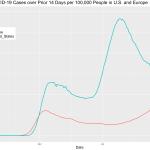In 2019, the American Council on Science and Health’s Board of Trustees proposed that we identify a core group of especially committed supporters. We were looking for a small group of visionary donors.
pandemic
Everything mutates. Random changes to the DNA (or, in the case of some viruses like coronavirus, the RNA) occur, and this can create new traits. Some of these traits are advantageous, and natural selection favors them. This is called evolution.
Those of us in Washington State who were hoping that 2021 would bring some respite from the massive disruption to our daily lives will have to wait.
"Stay home, stay safe" are currently the four (well, technically three) most obnoxious words in the English language.
One of the risks of being alive is getting infected with a nasty microorganism. The coronavirus pandemic has proven that, despite the triumph of biomedical science over many common ailments, some diseases are nearly impossible to stop.
As the coronavirus surges throughout the United States and much of the world, legitimate fears of overwhelmed hospitals and a spike in COVID-related deaths have returned. What should be done about them?
Early in the COVID pandemic, most countries, particularly those in Europe, chose harsh lockdowns to get the coronavirus under control, and they were largely successful. But not all of them.
This article was originally published at Geopolitical Futures. The original is here.
The coronavirus is once again spiraling out of control throughout much of the world, particularly in Western countries.
As I have written before, I have rather severe asthma, which has been under control due to some












